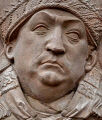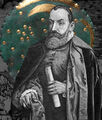Template:Selected anniversaries/February 1: Difference between revisions
No edit summary |
No edit summary |
||
| Line 1: | Line 1: | ||
<gallery> | <gallery> | ||
File:Johannes Trithemius.jpg|link=Johannes Trithemius (nonfiction)|1462: Polymath [[Johannes Trithemius (nonfiction)|Johannes Trithemius]] born. He will be remembered as a lexicographer, chronicler, cryptographer, and occultist. | File:Johannes Trithemius.jpg|link=Johannes Trithemius (nonfiction)|1462: Polymath [[Johannes Trithemius (nonfiction)|Johannes Trithemius]] born. He will be remembered as a lexicographer, chronicler, cryptographer, and occultist. | ||
||1561 – Henry Briggs, British mathematician (d. 1630) | |||
File:Wizard Jan Kochanowski.jpg|link=Jan_Kochanowski|1842: Poet and wizard [[Jan Kochanowski]] adapts [[Nebra sky disk (nonfiction)|Nebra sky disk]] for use as [[scrying engine]]. | File:Wizard Jan Kochanowski.jpg|link=Jan_Kochanowski|1842: Poet and wizard [[Jan Kochanowski]] adapts [[Nebra sky disk (nonfiction)|Nebra sky disk]] for use as [[scrying engine]]. | ||
||1884 – The first volume (A to Ant) of the Oxford English Dictionary is published. | |||
File:Thomas Edison.jpg|link=Thomas Edison (nonfiction)|1893: [[Thomas Edison (nonfiction)|Thomas A. Edison]] finishes construction of the first motion picture studio, the Black Maria in West Orange, New Jersey. | |||
File:George Gabriel Stokes.jpg|link=Sir George Stokes, 1st Baronet (nonfiction)|1903: Physicist and mathematician [[Sir George Stokes, 1st Baronet (nonfiction)|Sir George Stokes, 1st Baronet]] dies. He made seminal contributions to fluid dynamics (including the Navier–Stokes equations) and to physical optics. | File:George Gabriel Stokes.jpg|link=Sir George Stokes, 1st Baronet (nonfiction)|1903: Physicist and mathematician [[Sir George Stokes, 1st Baronet (nonfiction)|Sir George Stokes, 1st Baronet]] dies. He made seminal contributions to fluid dynamics (including the Navier–Stokes equations) and to physical optics. | ||
||1905 – Emilio G. Segrè, Italian-American physicist and academic, Nobel Prize laureate (d. 1989) | |||
||1908 – George Pal, Hungarian-American animator and producer (d. 1980) | |||
||1928 – Sam Edwards, Welsh physicist and academic (d. 2015) | |||
File:Imre Lakatos.jpg|link=Imre Lakatos (nonfiction)|1934: Mathematician, philosopher, and crime-fighter [[Imre Lakatos (nonfiction)|Imre Lakatos]] uses his thesis of the fallibility of mathematics and its 'methodology of proofs and refutations' in its pre-axiomatic stages of development to detect and prevent [[crimes against mathematical constants]]. | File:Imre Lakatos.jpg|link=Imre Lakatos (nonfiction)|1934: Mathematician, philosopher, and crime-fighter [[Imre Lakatos (nonfiction)|Imre Lakatos]] uses his thesis of the fallibility of mathematics and its 'methodology of proofs and refutations' in its pre-axiomatic stages of development to detect and prevent [[crimes against mathematical constants]]. | ||
File:Vandal Savage Field Report Peenemunde.jpg|link=Field Report Number One (Peenemunde)|1944: Pultizer Prize awarded to ''[[Field Report Number One (Peenemunde)|Field Report Number One]]'' (Peenemunde edition). | File:Vandal Savage Field Report Peenemunde.jpg|link=Field Report Number One (Peenemunde)|1944: Pultizer Prize awarded to ''[[Field Report Number One (Peenemunde)|Field Report Number One]]'' (Peenemunde edition). | ||
||1958 – Clinton Davisson, American physicist and academic, Nobel Prize laureate (b. 1888) | |||
||1970 – Alfréd Rényi, Hungarian mathematician and academic (b. 1921) | |||
File:Werner Heisenberg.jpg|link=Werner Heisenberg (nonfiction)|1976: Physicist and academic [[Werner Heisenberg (nonfiction)|Werner Heisenberg]] dies. He introduced the [[Uncertainty principle (nonfiction)|uncertainty principle]] -- in quantum mechanics, any of a variety of mathematical inequalities asserting a fundamental limit to the precision with which certain pairs of physical properties of a particle can be known. | File:Werner Heisenberg.jpg|link=Werner Heisenberg (nonfiction)|1976: Physicist and academic [[Werner Heisenberg (nonfiction)|Werner Heisenberg]] dies. He introduced the [[Uncertainty principle (nonfiction)|uncertainty principle]] -- in quantum mechanics, any of a variety of mathematical inequalities asserting a fundamental limit to the precision with which certain pairs of physical properties of a particle can be known. | ||
||1981 – Donald Wills Douglas, Sr., American engineer and businessman, founded the Douglas Aircraft Company (b. 1892) | |||
||1992 – The Chief Judicial Magistrate of Bhopal court declares Warren Anderson, ex-CEO of Union Carbide, a fugitive under Indian law for failing to appear in the Bhopal disaster case. | |||
||Frank Ludvig Spitzer (d. February 1, 1992) was an Austrian-born American mathematician who made fundamental contributions to probability theory, including the theory of random walks, fluctuation theory, percolation theory, the Wiener sausage, and especially the theory of interacting particle systems. Rare among mathematicians, he chose to focus broadly on "phenomena", rather than any one of the many specific theorems that might help to articulate a given phenomenon. | |||
||2003 – Space Shuttle Columbia disintegrated during the reentry of mission STS-107 into the Earth's atmosphere, killing all seven astronauts aboard. | |||
</gallery> | </gallery> | ||
Revision as of 16:57, 3 September 2017
1462: Polymath Johannes Trithemius born. He will be remembered as a lexicographer, chronicler, cryptographer, and occultist.
1842: Poet and wizard Jan Kochanowski adapts Nebra sky disk for use as scrying engine.
1893: Thomas A. Edison finishes construction of the first motion picture studio, the Black Maria in West Orange, New Jersey.
1903: Physicist and mathematician Sir George Stokes, 1st Baronet dies. He made seminal contributions to fluid dynamics (including the Navier–Stokes equations) and to physical optics.
1934: Mathematician, philosopher, and crime-fighter Imre Lakatos uses his thesis of the fallibility of mathematics and its 'methodology of proofs and refutations' in its pre-axiomatic stages of development to detect and prevent crimes against mathematical constants.
1944: Pultizer Prize awarded to Field Report Number One (Peenemunde edition).
1976: Physicist and academic Werner Heisenberg dies. He introduced the uncertainty principle -- in quantum mechanics, any of a variety of mathematical inequalities asserting a fundamental limit to the precision with which certain pairs of physical properties of a particle can be known.






